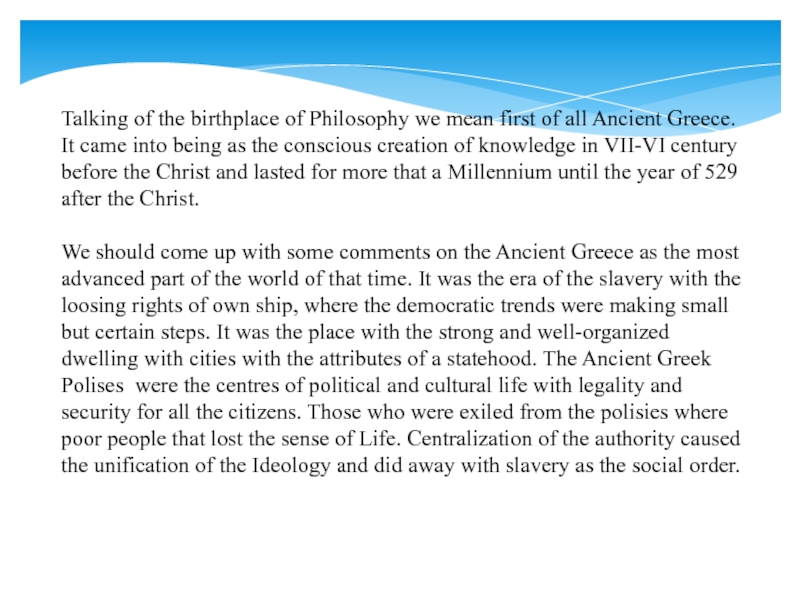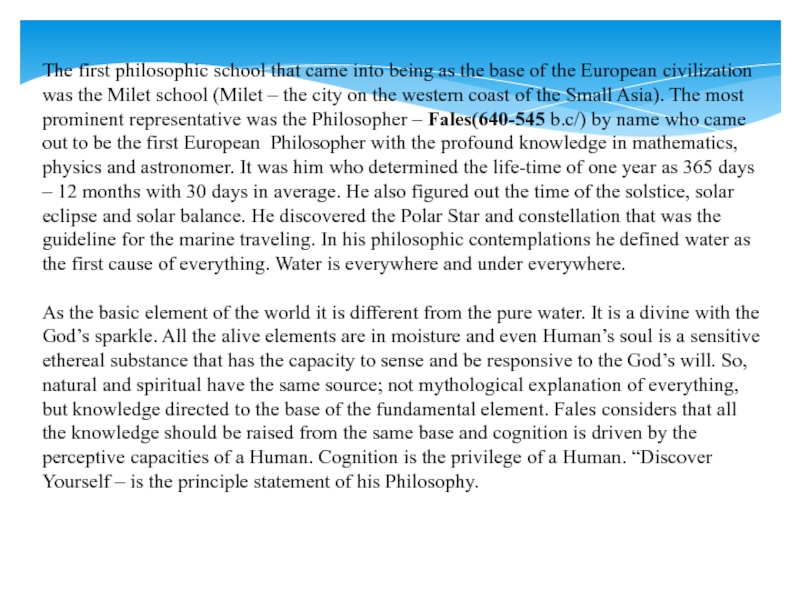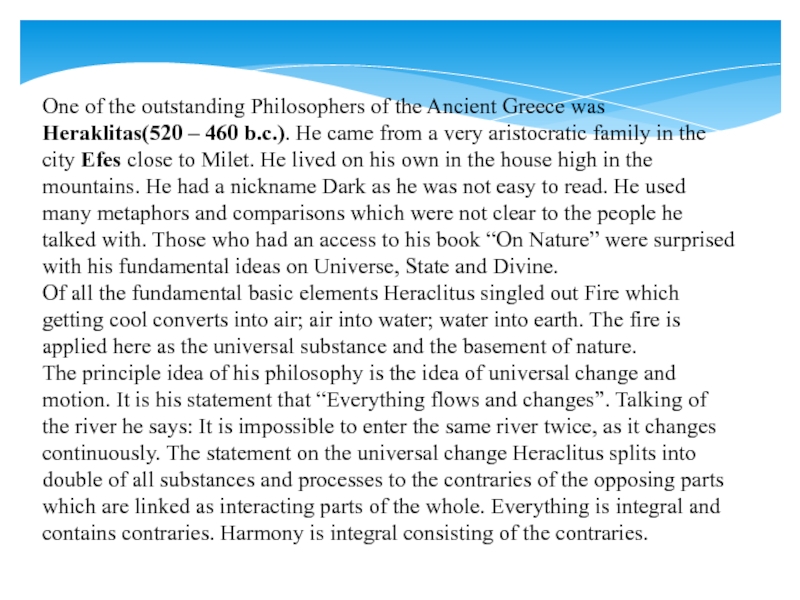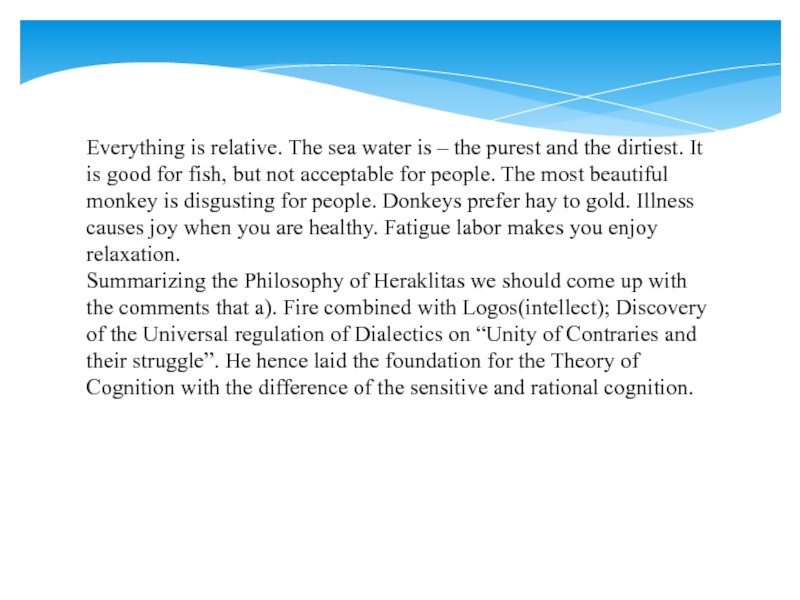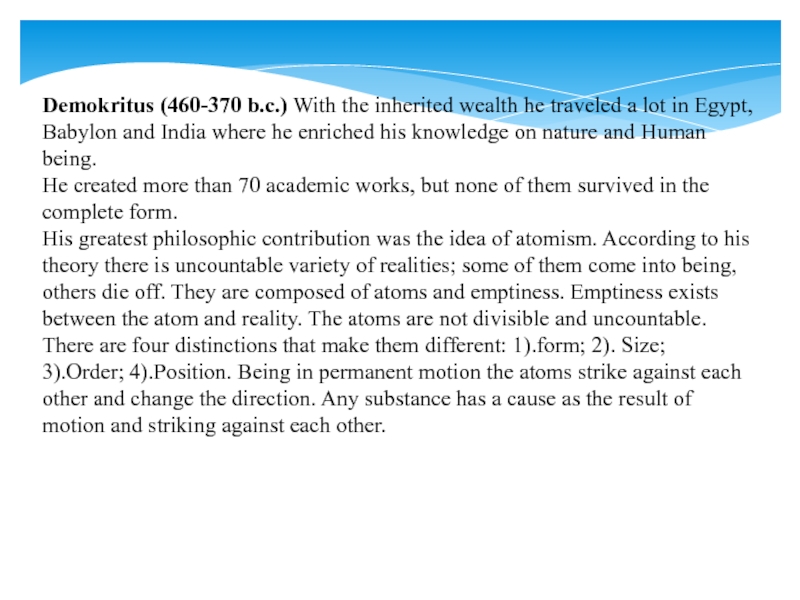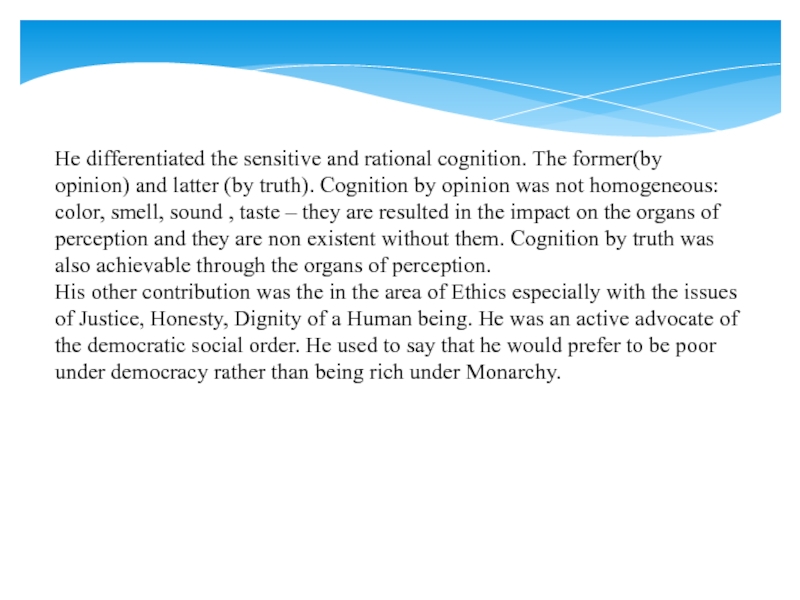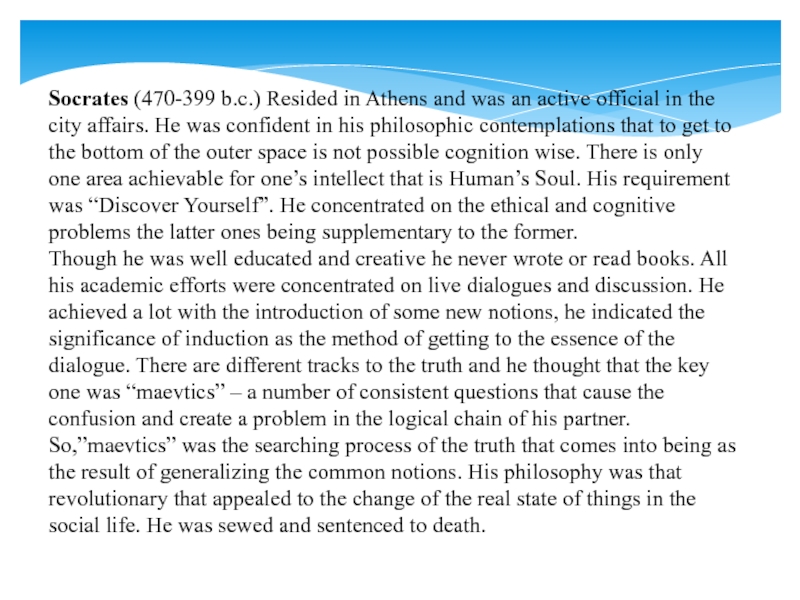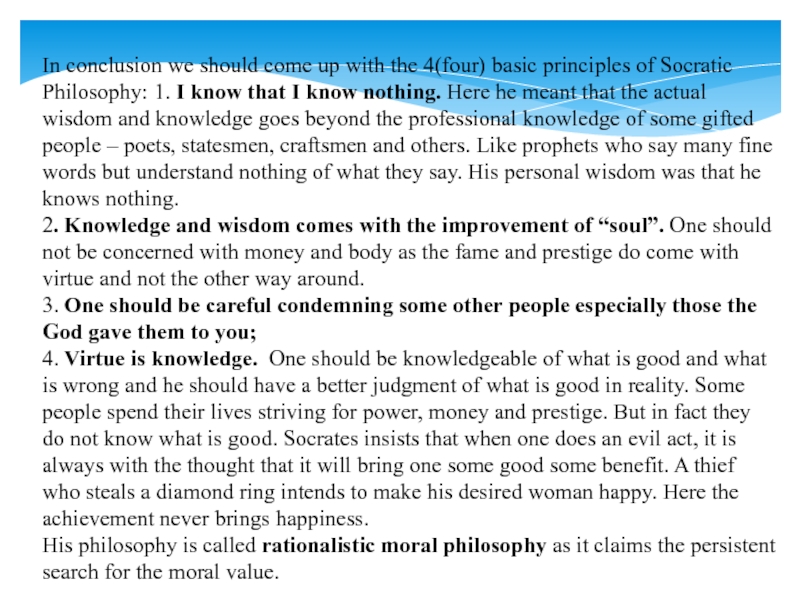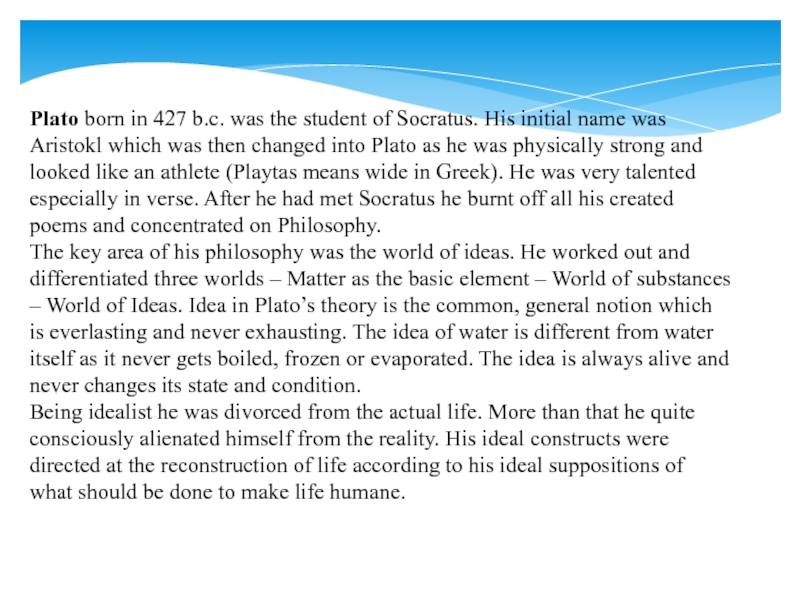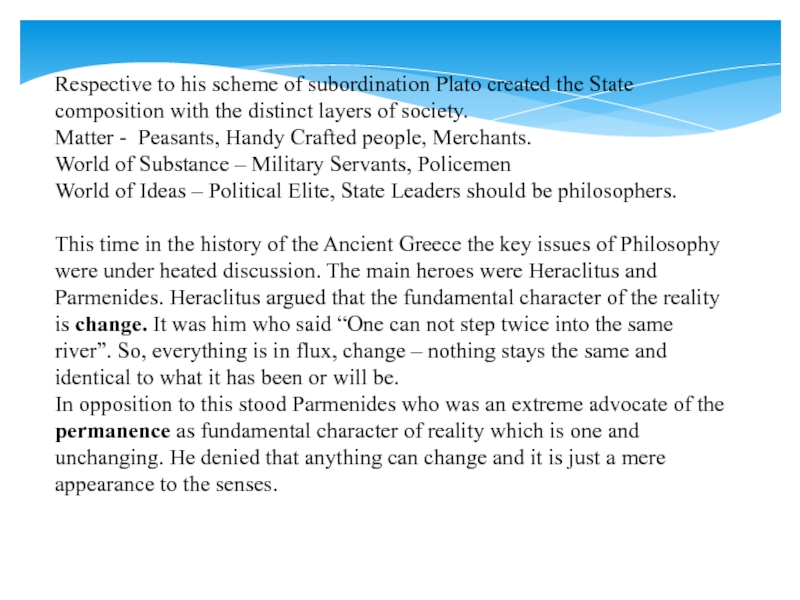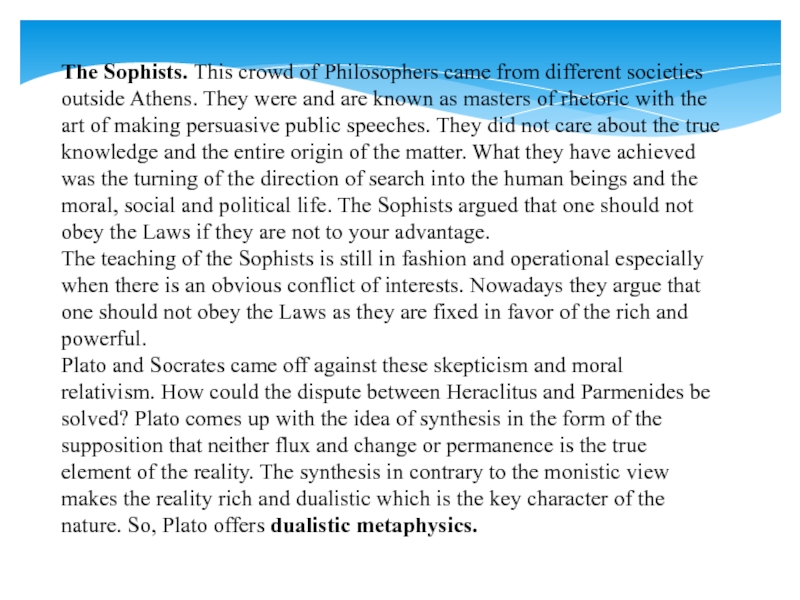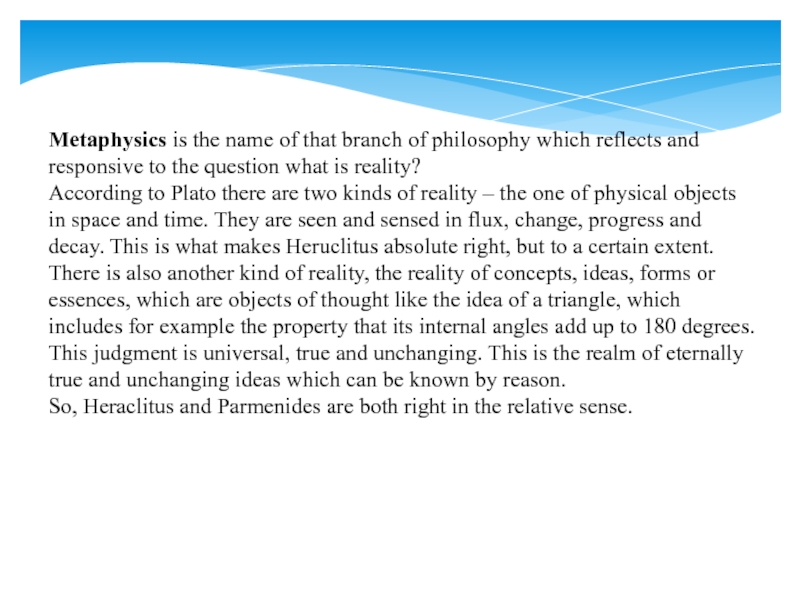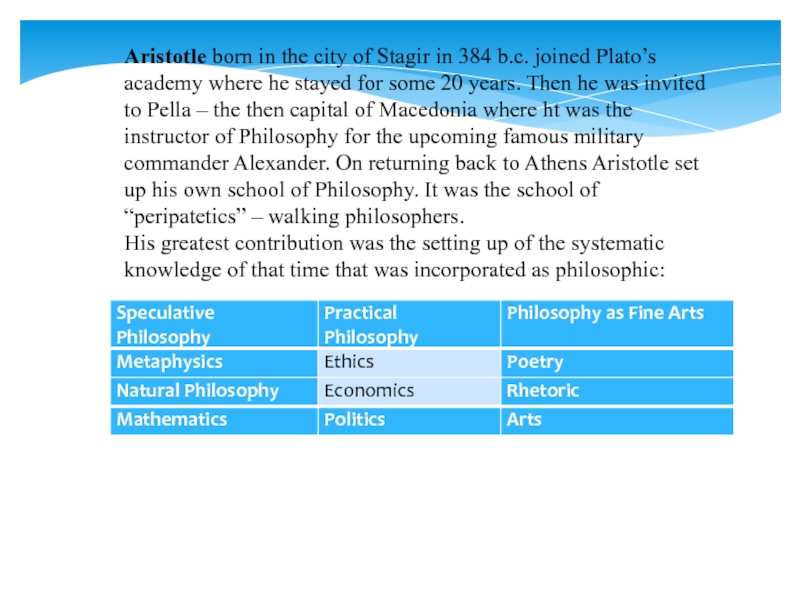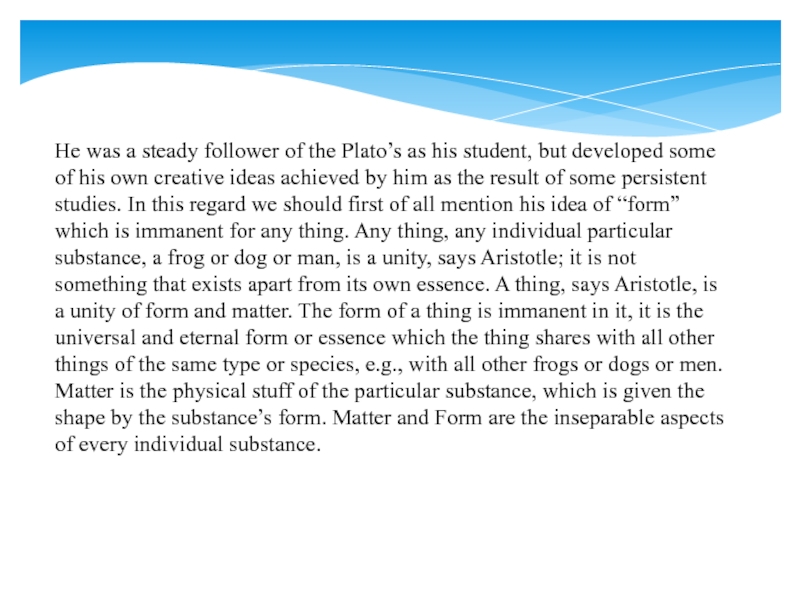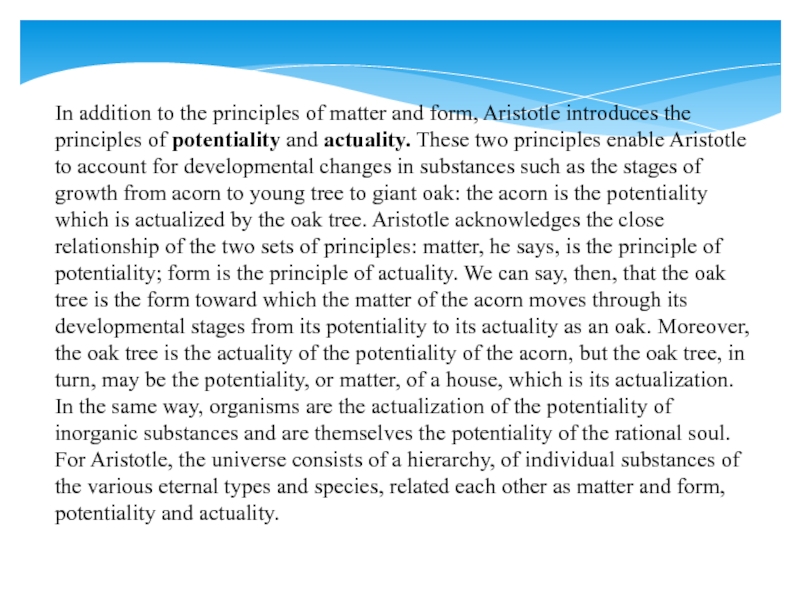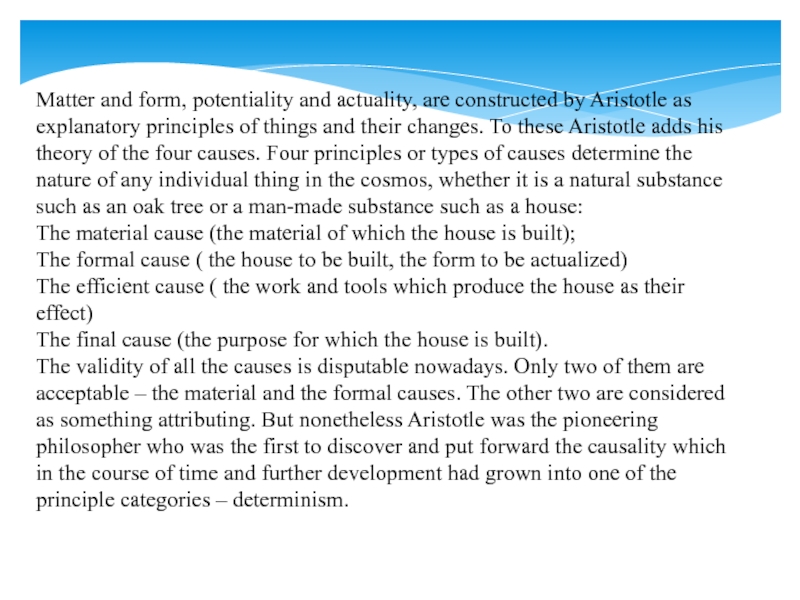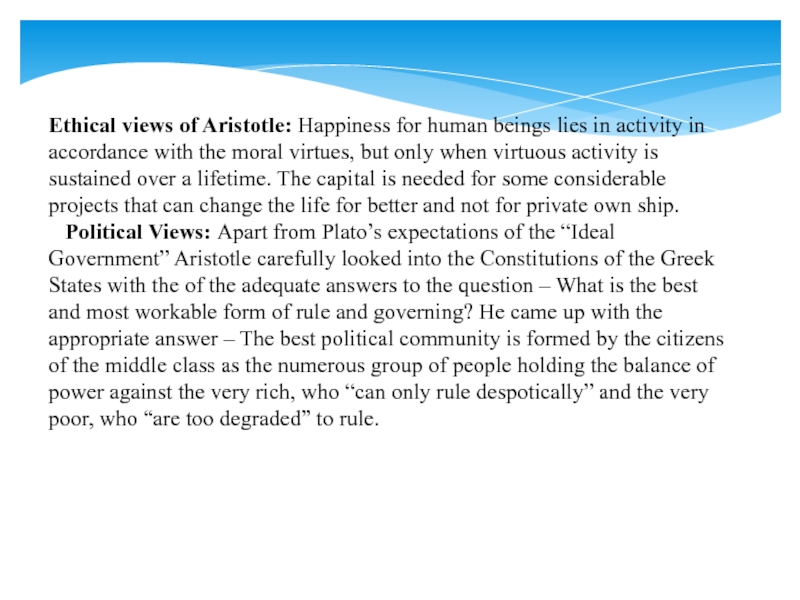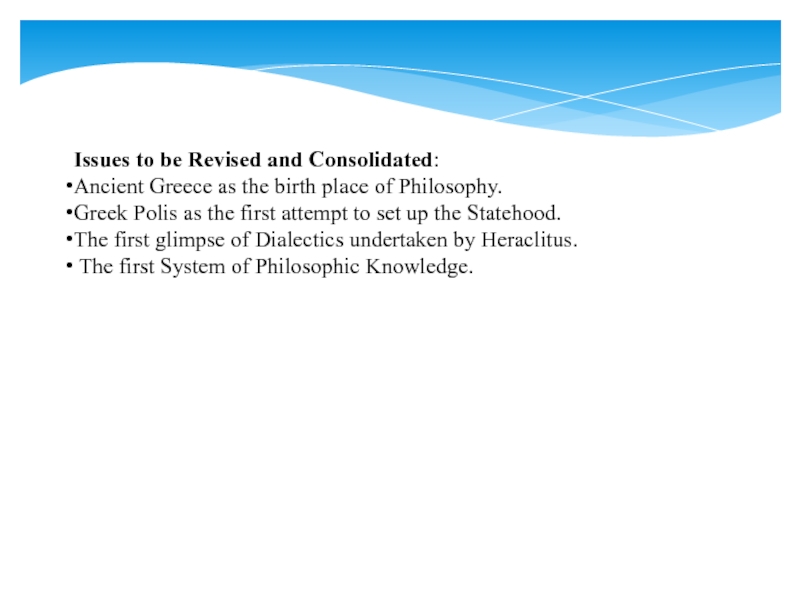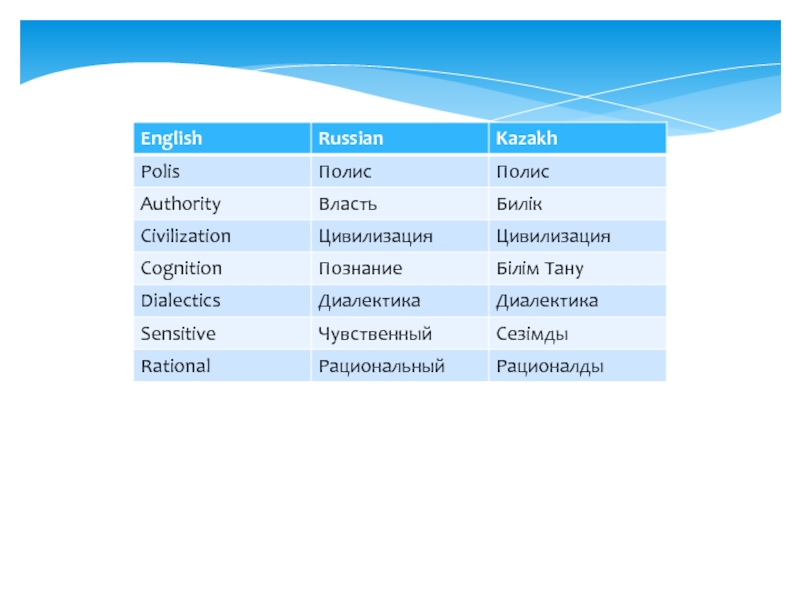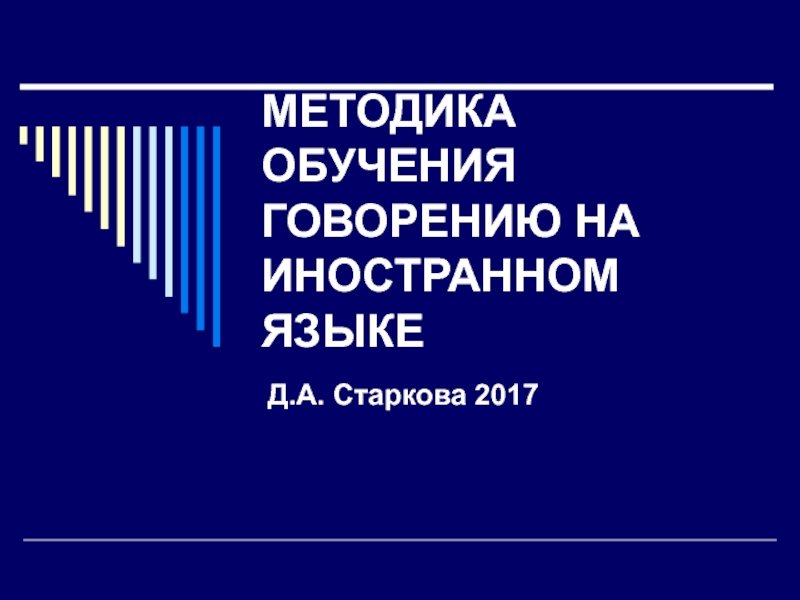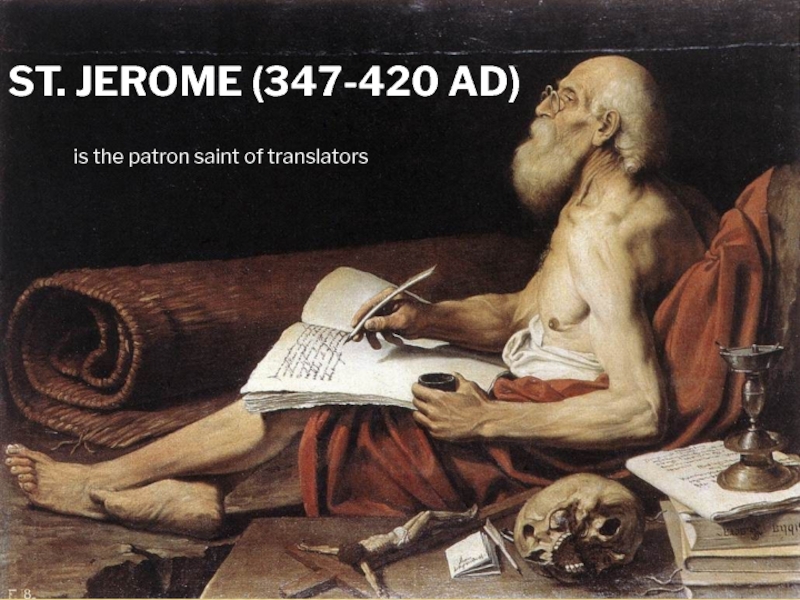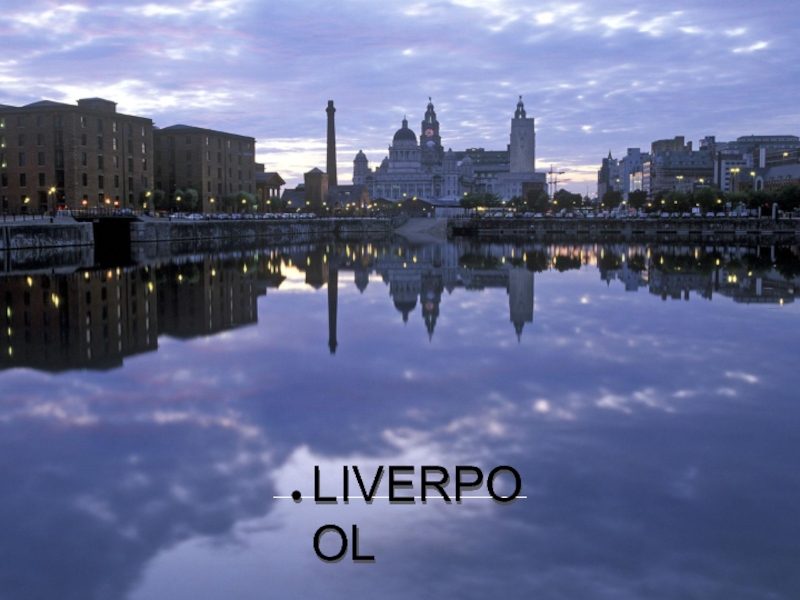any subject? For academic people it is a rhetorical question – which does not require an answer. Any study of any phenomenon should start with history so that one could see the commencement, go through all the major stages and get to the point of maturity of the present moment. How different is the history of Philosophy?
The History of Philosophy can be displayed as the Gallery of Heroes as many of them did actually make a great contribution to the progress of the Mankind. History of Philosophy can be lined up as the history of setting up of the philosophic categories as the lime stones of the entire concept.
- Главная
- Разное
- Дизайн
- Бизнес и предпринимательство
- Аналитика
- Образование
- Развлечения
- Красота и здоровье
- Финансы
- Государство
- Путешествия
- Спорт
- Недвижимость
- Армия
- Графика
- Культурология
- Еда и кулинария
- Лингвистика
- Английский язык
- Астрономия
- Алгебра
- Биология
- География
- Детские презентации
- Информатика
- История
- Литература
- Маркетинг
- Математика
- Медицина
- Менеджмент
- Музыка
- МХК
- Немецкий язык
- ОБЖ
- Обществознание
- Окружающий мир
- Педагогика
- Русский язык
- Технология
- Физика
- Философия
- Химия
- Шаблоны, картинки для презентаций
- Экология
- Экономика
- Юриспруденция
Ancient Philosophy презентация
Содержание
- 1. Ancient Philosophy
- 2. Talking of the birthplace of
- 3. The first philosophic school that came into
- 4. One of the outstanding Philosophers
- 5. Everything is relative. The sea water is
- 6. Demokritus (460-370 b.c.) With the inherited
- 7. He differentiated the sensitive
- 8. Socrates (470-399 b.c.) Resided in Athens
- 9. In conclusion we should come up with
- 10. Plato born in 427 b.c.
- 11. Respective to his scheme of subordination Plato
- 12. The Sophists. This crowd of Philosophers came
- 13. Metaphysics is the
- 14. Aristotle born in the city
- 15. He was a steady
- 16. In addition to the principles
- 17. Matter and form, potentiality and
- 18. Ethical views of Aristotle: Happiness
- 19. Issues to be Revised and Consolidated: Ancient
Слайд 2
Talking of the birthplace of Philosophy we mean first of all
Ancient Greece. It came into being as the conscious creation of knowledge in VII-VI century before the Christ and lasted for more that a Millennium until the year of 529 after the Christ.
We should come up with some comments on the Ancient Greece as the most advanced part of the world of that time. It was the era of the slavery with the loosing rights of own ship, where the democratic trends were making small but certain steps. It was the place with the strong and well-organized dwelling with cities with the attributes of a statehood. The Ancient Greek Polises were the centres of political and cultural life with legality and security for all the citizens. Those who were exiled from the polisies where poor people that lost the sense of Life. Centralization of the authority caused the unification of the Ideology and did away with slavery as the social order.
We should come up with some comments on the Ancient Greece as the most advanced part of the world of that time. It was the era of the slavery with the loosing rights of own ship, where the democratic trends were making small but certain steps. It was the place with the strong and well-organized dwelling with cities with the attributes of a statehood. The Ancient Greek Polises were the centres of political and cultural life with legality and security for all the citizens. Those who were exiled from the polisies where poor people that lost the sense of Life. Centralization of the authority caused the unification of the Ideology and did away with slavery as the social order.
Слайд 3The first philosophic school that came into being as the base
of the European civilization was the Milet school (Milet – the city on the western coast of the Small Asia). The most prominent representative was the Philosopher – Fales(640-545 b.c/) by name who came out to be the first European Philosopher with the profound knowledge in mathematics, physics and astronomer. It was him who determined the life-time of one year as 365 days – 12 months with 30 days in average. He also figured out the time of the solstice, solar eclipse and solar balance. He discovered the Polar Star and constellation that was the guideline for the marine traveling. In his philosophic contemplations he defined water as the first cause of everything. Water is everywhere and under everywhere.
As the basic element of the world it is different from the pure water. It is a divine with the God’s sparkle. All the alive elements are in moisture and even Human’s soul is a sensitive ethereal substance that has the capacity to sense and be responsive to the God’s will. So, natural and spiritual have the same source; not mythological explanation of everything, but knowledge directed to the base of the fundamental element. Fales considers that all the knowledge should be raised from the same base and cognition is driven by the perceptive capacities of a Human. Cognition is the privilege of a Human. “Discover Yourself – is the principle statement of his Philosophy.
As the basic element of the world it is different from the pure water. It is a divine with the God’s sparkle. All the alive elements are in moisture and even Human’s soul is a sensitive ethereal substance that has the capacity to sense and be responsive to the God’s will. So, natural and spiritual have the same source; not mythological explanation of everything, but knowledge directed to the base of the fundamental element. Fales considers that all the knowledge should be raised from the same base and cognition is driven by the perceptive capacities of a Human. Cognition is the privilege of a Human. “Discover Yourself – is the principle statement of his Philosophy.
Слайд 4
One of the outstanding Philosophers of the Ancient Greece was Heraklitas(520
– 460 b.c.). He came from a very aristocratic family in the city Efes close to Milet. He lived on his own in the house high in the mountains. He had a nickname Dark as he was not easy to read. He used many metaphors and comparisons which were not clear to the people he talked with. Those who had an access to his book “On Nature” were surprised with his fundamental ideas on Universe, State and Divine.
Of all the fundamental basic elements Heraclitus singled out Fire which getting cool converts into air; air into water; water into earth. The fire is applied here as the universal substance and the basement of nature.
The principle idea of his philosophy is the idea of universal change and motion. It is his statement that “Everything flows and changes”. Talking of the river he says: It is impossible to enter the same river twice, as it changes continuously. The statement on the universal change Heraclitus splits into double of all substances and processes to the contraries of the opposing parts which are linked as interacting parts of the whole. Everything is integral and contains contraries. Harmony is integral consisting of the contraries.
Of all the fundamental basic elements Heraclitus singled out Fire which getting cool converts into air; air into water; water into earth. The fire is applied here as the universal substance and the basement of nature.
The principle idea of his philosophy is the idea of universal change and motion. It is his statement that “Everything flows and changes”. Talking of the river he says: It is impossible to enter the same river twice, as it changes continuously. The statement on the universal change Heraclitus splits into double of all substances and processes to the contraries of the opposing parts which are linked as interacting parts of the whole. Everything is integral and contains contraries. Harmony is integral consisting of the contraries.
Слайд 5Everything is relative. The sea water is – the purest and
the dirtiest. It is good for fish, but not acceptable for people. The most beautiful monkey is disgusting for people. Donkeys prefer hay to gold. Illness causes joy when you are healthy. Fatigue labor makes you enjoy relaxation.
Summarizing the Philosophy of Heraklitas we should come up with the comments that a). Fire combined with Logos(intellect); Discovery of the Universal regulation of Dialectics on “Unity of Contraries and their struggle”. He hence laid the foundation for the Theory of Cognition with the difference of the sensitive and rational cognition.
Summarizing the Philosophy of Heraklitas we should come up with the comments that a). Fire combined with Logos(intellect); Discovery of the Universal regulation of Dialectics on “Unity of Contraries and their struggle”. He hence laid the foundation for the Theory of Cognition with the difference of the sensitive and rational cognition.
Слайд 6
Demokritus (460-370 b.c.) With the inherited wealth he traveled a lot
in Egypt, Babylon and India where he enriched his knowledge on nature and Human being.
He created more than 70 academic works, but none of them survived in the complete form.
His greatest philosophic contribution was the idea of atomism. According to his theory there is uncountable variety of realities; some of them come into being, others die off. They are composed of atoms and emptiness. Emptiness exists between the atom and reality. The atoms are not divisible and uncountable. There are four distinctions that make them different: 1).form; 2). Size; 3).Order; 4).Position. Being in permanent motion the atoms strike against each other and change the direction. Any substance has a cause as the result of motion and striking against each other.
He created more than 70 academic works, but none of them survived in the complete form.
His greatest philosophic contribution was the idea of atomism. According to his theory there is uncountable variety of realities; some of them come into being, others die off. They are composed of atoms and emptiness. Emptiness exists between the atom and reality. The atoms are not divisible and uncountable. There are four distinctions that make them different: 1).form; 2). Size; 3).Order; 4).Position. Being in permanent motion the atoms strike against each other and change the direction. Any substance has a cause as the result of motion and striking against each other.
Слайд 7
He differentiated the sensitive and rational cognition. The former(by opinion) and
latter (by truth). Cognition by opinion was not homogeneous: color, smell, sound , taste – they are resulted in the impact on the organs of perception and they are non existent without them. Cognition by truth was also achievable through the organs of perception.
His other contribution was the in the area of Ethics especially with the issues of Justice, Honesty, Dignity of a Human being. He was an active advocate of the democratic social order. He used to say that he would prefer to be poor under democracy rather than being rich under Monarchy.
His other contribution was the in the area of Ethics especially with the issues of Justice, Honesty, Dignity of a Human being. He was an active advocate of the democratic social order. He used to say that he would prefer to be poor under democracy rather than being rich under Monarchy.
Слайд 8
Socrates (470-399 b.c.) Resided in Athens and was an active official
in the city affairs. He was confident in his philosophic contemplations that to get to the bottom of the outer space is not possible cognition wise. There is only one area achievable for one’s intellect that is Human’s Soul. His requirement was “Discover Yourself”. He concentrated on the ethical and cognitive problems the latter ones being supplementary to the former.
Though he was well educated and creative he never wrote or read books. All his academic efforts were concentrated on live dialogues and discussion. He achieved a lot with the introduction of some new notions, he indicated the significance of induction as the method of getting to the essence of the dialogue. There are different tracks to the truth and he thought that the key one was “maevtics” – a number of consistent questions that cause the confusion and create a problem in the logical chain of his partner. So,”maevtics” was the searching process of the truth that comes into being as the result of generalizing the common notions. His philosophy was that revolutionary that appealed to the change of the real state of things in the social life. He was sewed and sentenced to death.
Though he was well educated and creative he never wrote or read books. All his academic efforts were concentrated on live dialogues and discussion. He achieved a lot with the introduction of some new notions, he indicated the significance of induction as the method of getting to the essence of the dialogue. There are different tracks to the truth and he thought that the key one was “maevtics” – a number of consistent questions that cause the confusion and create a problem in the logical chain of his partner. So,”maevtics” was the searching process of the truth that comes into being as the result of generalizing the common notions. His philosophy was that revolutionary that appealed to the change of the real state of things in the social life. He was sewed and sentenced to death.
Слайд 9In conclusion we should come up with the 4(four) basic principles
of Socratic Philosophy: 1. I know that I know nothing. Here he meant that the actual wisdom and knowledge goes beyond the professional knowledge of some gifted people – poets, statesmen, craftsmen and others. Like prophets who say many fine words but understand nothing of what they say. His personal wisdom was that he knows nothing.
2. Knowledge and wisdom comes with the improvement of “soul”. One should not be concerned with money and body as the fame and prestige do come with virtue and not the other way around.
3. One should be careful condemning some other people especially those the God gave them to you;
4. Virtue is knowledge. One should be knowledgeable of what is good and what is wrong and he should have a better judgment of what is good in reality. Some people spend their lives striving for power, money and prestige. But in fact they do not know what is good. Socrates insists that when one does an evil act, it is always with the thought that it will bring one some good some benefit. A thief who steals a diamond ring intends to make his desired woman happy. Here the achievement never brings happiness.
His philosophy is called rationalistic moral philosophy as it claims the persistent search for the moral value.
2. Knowledge and wisdom comes with the improvement of “soul”. One should not be concerned with money and body as the fame and prestige do come with virtue and not the other way around.
3. One should be careful condemning some other people especially those the God gave them to you;
4. Virtue is knowledge. One should be knowledgeable of what is good and what is wrong and he should have a better judgment of what is good in reality. Some people spend their lives striving for power, money and prestige. But in fact they do not know what is good. Socrates insists that when one does an evil act, it is always with the thought that it will bring one some good some benefit. A thief who steals a diamond ring intends to make his desired woman happy. Here the achievement never brings happiness.
His philosophy is called rationalistic moral philosophy as it claims the persistent search for the moral value.
Слайд 10
Plato born in 427 b.c. was the student of Socratus. His
initial name was Aristokl which was then changed into Plato as he was physically strong and looked like an athlete (Playtas means wide in Greek). He was very talented especially in verse. After he had met Socratus he burnt off all his created poems and concentrated on Philosophy.
The key area of his philosophy was the world of ideas. He worked out and differentiated three worlds – Matter as the basic element – World of substances – World of Ideas. Idea in Plato’s theory is the common, general notion which is everlasting and never exhausting. The idea of water is different from water itself as it never gets boiled, frozen or evaporated. The idea is always alive and never changes its state and condition.
Being idealist he was divorced from the actual life. More than that he quite consciously alienated himself from the reality. His ideal constructs were directed at the reconstruction of life according to his ideal suppositions of what should be done to make life humane.
The key area of his philosophy was the world of ideas. He worked out and differentiated three worlds – Matter as the basic element – World of substances – World of Ideas. Idea in Plato’s theory is the common, general notion which is everlasting and never exhausting. The idea of water is different from water itself as it never gets boiled, frozen or evaporated. The idea is always alive and never changes its state and condition.
Being idealist he was divorced from the actual life. More than that he quite consciously alienated himself from the reality. His ideal constructs were directed at the reconstruction of life according to his ideal suppositions of what should be done to make life humane.
Слайд 11Respective to his scheme of subordination Plato created the State composition
with the distinct layers of society.
Matter - Peasants, Handy Crafted people, Merchants.
World of Substance – Military Servants, Policemen
World of Ideas – Political Elite, State Leaders should be philosophers.
This time in the history of the Ancient Greece the key issues of Philosophy were under heated discussion. The main heroes were Heraclitus and Parmenides. Heraclitus argued that the fundamental character of the reality is change. It was him who said “One can not step twice into the same river”. So, everything is in flux, change – nothing stays the same and identical to what it has been or will be.
In opposition to this stood Parmenides who was an extreme advocate of the permanence as fundamental character of reality which is one and unchanging. He denied that anything can change and it is just a mere appearance to the senses.
Matter - Peasants, Handy Crafted people, Merchants.
World of Substance – Military Servants, Policemen
World of Ideas – Political Elite, State Leaders should be philosophers.
This time in the history of the Ancient Greece the key issues of Philosophy were under heated discussion. The main heroes were Heraclitus and Parmenides. Heraclitus argued that the fundamental character of the reality is change. It was him who said “One can not step twice into the same river”. So, everything is in flux, change – nothing stays the same and identical to what it has been or will be.
In opposition to this stood Parmenides who was an extreme advocate of the permanence as fundamental character of reality which is one and unchanging. He denied that anything can change and it is just a mere appearance to the senses.
Слайд 12The Sophists. This crowd of Philosophers came from different societies outside
Athens. They were and are known as masters of rhetoric with the art of making persuasive public speeches. They did not care about the true knowledge and the entire origin of the matter. What they have achieved was the turning of the direction of search into the human beings and the moral, social and political life. The Sophists argued that one should not obey the Laws if they are not to your advantage.
The teaching of the Sophists is still in fashion and operational especially when there is an obvious conflict of interests. Nowadays they argue that one should not obey the Laws as they are fixed in favor of the rich and powerful.
Plato and Socrates came off against these skepticism and moral relativism. How could the dispute between Heraclitus and Parmenides be solved? Plato comes up with the idea of synthesis in the form of the supposition that neither flux and change or permanence is the true element of the reality. The synthesis in contrary to the monistic view makes the reality rich and dualistic which is the key character of the nature. So, Plato offers dualistic metaphysics.
The teaching of the Sophists is still in fashion and operational especially when there is an obvious conflict of interests. Nowadays they argue that one should not obey the Laws as they are fixed in favor of the rich and powerful.
Plato and Socrates came off against these skepticism and moral relativism. How could the dispute between Heraclitus and Parmenides be solved? Plato comes up with the idea of synthesis in the form of the supposition that neither flux and change or permanence is the true element of the reality. The synthesis in contrary to the monistic view makes the reality rich and dualistic which is the key character of the nature. So, Plato offers dualistic metaphysics.
Слайд 13
Metaphysics is the name of that branch of philosophy which
reflects and responsive to the question what is reality?
According to Plato there are two kinds of reality – the one of physical objects in space and time. They are seen and sensed in flux, change, progress and decay. This is what makes Heruclitus absolute right, but to a certain extent.
There is also another kind of reality, the reality of concepts, ideas, forms or essences, which are objects of thought like the idea of a triangle, which includes for example the property that its internal angles add up to 180 degrees. This judgment is universal, true and unchanging. This is the realm of eternally true and unchanging ideas which can be known by reason.
So, Heraclitus and Parmenides are both right in the relative sense.
According to Plato there are two kinds of reality – the one of physical objects in space and time. They are seen and sensed in flux, change, progress and decay. This is what makes Heruclitus absolute right, but to a certain extent.
There is also another kind of reality, the reality of concepts, ideas, forms or essences, which are objects of thought like the idea of a triangle, which includes for example the property that its internal angles add up to 180 degrees. This judgment is universal, true and unchanging. This is the realm of eternally true and unchanging ideas which can be known by reason.
So, Heraclitus and Parmenides are both right in the relative sense.
Слайд 14
Aristotle born in the city of Stagir in 384 b.c. joined
Plato’s academy where he stayed for some 20 years. Then he was invited to Pella – the then capital of Macedonia where ht was the instructor of Philosophy for the upcoming famous military commander Alexander. On returning back to Athens Aristotle set up his own school of Philosophy. It was the school of “peripatetics” – walking philosophers.
His greatest contribution was the setting up of the systematic knowledge of that time that was incorporated as philosophic:
His greatest contribution was the setting up of the systematic knowledge of that time that was incorporated as philosophic:
Слайд 15
He was a steady follower of the Plato’s as his student,
but developed some of his own creative ideas achieved by him as the result of some persistent studies. In this regard we should first of all mention his idea of “form” which is immanent for any thing. Any thing, any individual particular substance, a frog or dog or man, is a unity, says Aristotle; it is not something that exists apart from its own essence. A thing, says Aristotle, is a unity of form and matter. The form of a thing is immanent in it, it is the universal and eternal form or essence which the thing shares with all other things of the same type or species, e.g., with all other frogs or dogs or men. Matter is the physical stuff of the particular substance, which is given the shape by the substance’s form. Matter and Form are the inseparable aspects of every individual substance.
Слайд 16
In addition to the principles of matter and form, Aristotle introduces
the principles of potentiality and actuality. These two principles enable Aristotle to account for developmental changes in substances such as the stages of growth from acorn to young tree to giant oak: the acorn is the potentiality which is actualized by the oak tree. Aristotle acknowledges the close relationship of the two sets of principles: matter, he says, is the principle of potentiality; form is the principle of actuality. We can say, then, that the oak tree is the form toward which the matter of the acorn moves through its developmental stages from its potentiality to its actuality as an oak. Moreover, the oak tree is the actuality of the potentiality of the acorn, but the oak tree, in turn, may be the potentiality, or matter, of a house, which is its actualization. In the same way, organisms are the actualization of the potentiality of inorganic substances and are themselves the potentiality of the rational soul. For Aristotle, the universe consists of a hierarchy, of individual substances of the various eternal types and species, related each other as matter and form, potentiality and actuality.
Слайд 17
Matter and form, potentiality and actuality, are constructed by Aristotle as
explanatory principles of things and their changes. To these Aristotle adds his theory of the four causes. Four principles or types of causes determine the nature of any individual thing in the cosmos, whether it is a natural substance such as an oak tree or a man-made substance such as a house:
The material cause (the material of which the house is built);
The formal cause ( the house to be built, the form to be actualized)
The efficient cause ( the work and tools which produce the house as their effect)
The final cause (the purpose for which the house is built).
The validity of all the causes is disputable nowadays. Only two of them are acceptable – the material and the formal causes. The other two are considered as something attributing. But nonetheless Aristotle was the pioneering philosopher who was the first to discover and put forward the causality which in the course of time and further development had grown into one of the principle categories – determinism.
The material cause (the material of which the house is built);
The formal cause ( the house to be built, the form to be actualized)
The efficient cause ( the work and tools which produce the house as their effect)
The final cause (the purpose for which the house is built).
The validity of all the causes is disputable nowadays. Only two of them are acceptable – the material and the formal causes. The other two are considered as something attributing. But nonetheless Aristotle was the pioneering philosopher who was the first to discover and put forward the causality which in the course of time and further development had grown into one of the principle categories – determinism.
Слайд 18
Ethical views of Aristotle: Happiness for human beings lies in activity
in accordance with the moral virtues, but only when virtuous activity is sustained over a lifetime. The capital is needed for some considerable projects that can change the life for better and not for private own ship.
Political Views: Apart from Plato’s expectations of the “Ideal Government” Aristotle carefully looked into the Constitutions of the Greek States with the of the adequate answers to the question – What is the best and most workable form of rule and governing? He came up with the appropriate answer – The best political community is formed by the citizens of the middle class as the numerous group of people holding the balance of power against the very rich, who “can only rule despotically” and the very poor, who “are too degraded” to rule.
Political Views: Apart from Plato’s expectations of the “Ideal Government” Aristotle carefully looked into the Constitutions of the Greek States with the of the adequate answers to the question – What is the best and most workable form of rule and governing? He came up with the appropriate answer – The best political community is formed by the citizens of the middle class as the numerous group of people holding the balance of power against the very rich, who “can only rule despotically” and the very poor, who “are too degraded” to rule.
Слайд 19Issues to be Revised and Consolidated:
Ancient Greece as the birth place
of Philosophy.
Greek Polis as the first attempt to set up the Statehood.
The first glimpse of Dialectics undertaken by Heraclitus.
The first System of Philosophic Knowledge.
Greek Polis as the first attempt to set up the Statehood.
The first glimpse of Dialectics undertaken by Heraclitus.
The first System of Philosophic Knowledge.

